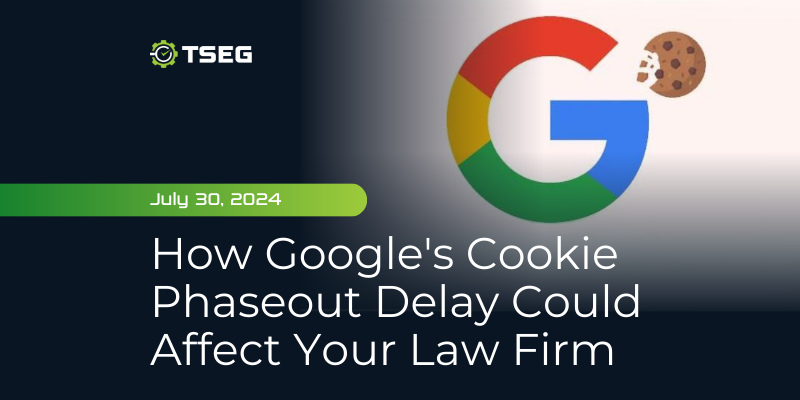How Google’s Cookie Phaseout Delay Could Affect Your Law Firm
Posted on Tuesday, July 30th, 2024 at 1:40 pm
Google’s Third-Party Cookie Phaseout Plan
Google has announced a delay in its planned phaseout of third-party cookies, initially set for 2024. This decision comes after significant feedback from regulators, advertisers, and stakeholders who expressed concerns over privacy and the efficacy of alternative tracking methods. Google’s move to extend the timeline provides additional time for businesses to adapt and for the company to enhance its privacy-preserving technologies.
Third-party cookies have long been a cornerstone of digital advertising, allowing advertisers to track users across different websites and deliver targeted ads. However, growing privacy concerns have prompted a shift towards more secure and private methods of tracking. Google’s decision to phase out these cookies aligns with broader industry trends toward prioritizing user privacy.
Why is This Decision Being Delayed?
The delay in Google’s phaseout of third-party cookies is a response to the complex balance between maintaining effective ad targeting and enhancing user privacy. Many in the marketing industry have expressed mixed reactions.
Positive Reactions to the Delay
Proponents of the delay argue that this additional time is essential for businesses to transition smoothly to new tracking technologies. They believe the postponement provides a critical window to test and implement first-party data strategies and contextual advertising, which are seen as more privacy-compliant alternatives to third-party cookies. Law firms, in particular, can benefit from this period by developing strong data collection practices and refining their client engagement strategies. The delay also allows for a more measured approach to adopting new technologies like Google’s Privacy Sandbox and Federated Learning of Cohorts (FLoC), ensuring that these tools are thoroughly vetted and optimized before becoming the industry standard.
Additionally, supporters highlight that the postponement mitigates the risk of disruption in advertising effectiveness. Abrupt changes could lead to significant short-term losses in ad performance, which could be detrimental for law firms relying heavily on digital marketing for client acquisition. By extending the timeline, Google is allowing the industry to adapt incrementally, minimizing potential negative impacts on marketing campaigns.
Frustrations with the Delay
Conversely, other advertisers are frustrated by the extended reliance on third-party cookies, viewing it as a barrier to fully embracing privacy-centric technologies. They argue that the delay perpetuates the use of outdated and invasive tracking methods that have already been identified as problematic from a privacy standpoint. This postponement, they contend, slows down the industry’s progress toward more ethical and transparent data practices.
Critics of the delay are also concerned about the uncertainty it introduces into long-term digital marketing strategies. The lack of a clear and definitive timeline for the phaseout creates challenges in planning and investment. Law firms may find it difficult to allocate resources effectively when the future of tracking technology remains in flux. This uncertainty can hinder innovation and slow down the adoption of new, privacy-preserving technologies that could otherwise benefit both consumers and businesses.
Google’s Perspective
Google’s commitment to refining its privacy-preserving technologies indicates a focus on developing solutions that meet regulatory standards and industry needs. By extending the timeline, Google has provided law firms with a window to adjust and optimize their digital marketing approaches. The company aims to ensure that new tracking methods are both effective and respectful of user privacy.
Understanding Privacy-Preserving Technologies
Understanding and integrating privacy-preserving technologies is becoming increasingly important for law firms. These technologies aim to balance effective ad targeting with the need to protect user privacy. Here are some key privacy-preserving alternatives to third-party cookies:

First-Party Data Collection
First-party data refers to information collected directly from users through interactions on a law firm’s website. This data includes user behaviors, preferences, and engagement metrics that can help personalize marketing efforts. Unlike third-party cookies, first-party data is obtained with user consent, making it more compliant with privacy regulations. Law firms can use this data to build detailed client profiles and deliver targeted content that meets the specific needs of potential clients.
Contextual Advertising
Contextual advertising involves displaying ads based on the content of the webpage rather than tracking individual users. This approach respects user privacy by not following users across different sites. Instead, it matches ads with relevant content, ensuring that advertisements are seen by an interested audience. For law firms, this means their ads can appear next to articles about legal issues, reaching readers who are already engaged with related content.
Federated Learning of Cohorts (FLoC)
Google’s Federated Learning of Cohorts (FLoC) is an initiative aimed at grouping users into cohorts based on similar browsing behaviors, rather than tracking individual activities. Advertisers can target these cohorts without identifying individual users. Although FLoC has received mixed feedback and is still under development, it represents a significant step towards privacy-preserving ad targeting.
Privacy Sandbox
Google’s Privacy Sandbox is a set of proposals to create web standards that both protect user privacy and allow for personalized advertising. The Privacy Sandbox includes various APIs that can perform tasks currently reliant on third-party cookies, such as ad targeting and conversion measurement, without compromising user privacy. Law firms should stay informed about developments in the Privacy Sandbox to effectively utilize these tools as they become available.

Partner With TSEG
At TSEG, we understand the complexities and changes in digital marketing and privacy regulations. Our team is well-versed in the latest technologies and strategies to ensure your marketing efforts are both effective and compliant with emerging privacy standards. Partnering with TSEG means you’ll benefit from our expertise in adapting to these changes, allowing you to focus on what you do best—serving your clients.
